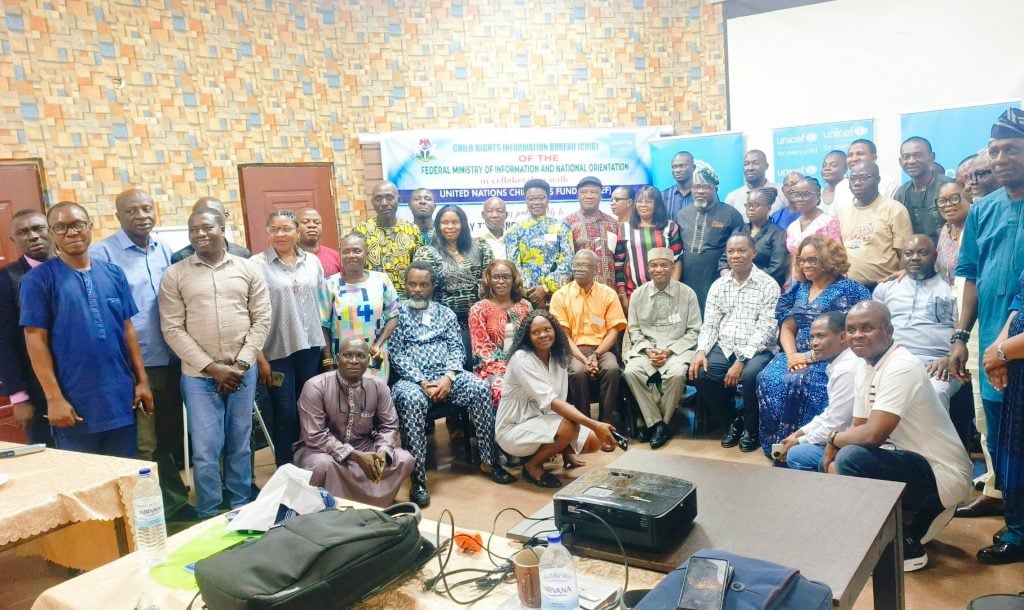Angela Onwuzoo
The United Nations Children’s Fund, the Federal Ministry of Information and National Orientation, and communication specialists have again reminded journalists to be ethical when reporting on children-related issues and rights, ensuring that their reports prioritise children’s protection and interests.
They advised journalists to shun stories that would cause harm and stigma to children while trying to protect them amid the rising insecurity, violence, hunger, malnutrition, child labour, and child abuse in the country.
According to them, any story that spotlights a child in a bad light and also as a victim will harm the child rather than offer protection.
The stakeholders spoke at a two-day training for media practitioners on ethical journalism and child rights reporting, organised by the Child Rights Information Bureau of the Federal Ministry of Information and National Orientation in collaboration with UNICEF.
The event, held at Kakanfo Hotel, Ibadan, Oyo State, had over 30 journalists, editors, and correspondents from various print and electronic media in attendance, to advocate for child protection and full implementation of the Child Rights Act.
Nigeria adopted the Child’s Rights Act in 2003 and promised to protect children’s rights in line with the United Nations Convention on the Rights of the Child and the African Charter on the Rights and Welfare of the Child.
The Convention explains who children are, all their rights, and the responsibilities of governments. The Convention states that all rights are connected, they are all equally important, and they cannot be taken away from children.
According to UNICEF, children are neither the property of their parents nor are they helpless objects of charity.
“They are human beings and are the subject of their own rights., The Convention on the Rights of the Child sets out the rights that must be realized for children to develop to their full potential”, it noted.
In her keynote address titled “Why Ethical Reporting of Children Matters in Nigeria”, Chief of UNICEF Lagos Field Office, Celine Lafoucriere, said the importance of reporting issues affecting children ethically needs not be overemphasised, citing their vulnerability.
‘Why does ethical reporting for children matter for UNICEF? First, it protects the most vulnerable. Children are not miniature adults”, Lafoucriere said.
She cautioned journalists against reporting children as miniature adults, reiterating that ethical journalism builds trust and protects the vulnerable.
Lafoucriere noted, “At UNICEF, we believe that every child has the right to be seen, heard, and protected. Ethical reporting is not just a professional standard; it is a moral imperative.
“It is about ensuring that children are portrayed with dignity, that their stories are told with care, and that their rights are never compromised in the pursuit of headlines or money-making.”
Admonishing journalists to be champions of ethical reporting, the UNICEF Lagos Field Office Chief said, “Our expectation is clear, that you leave this training not only with new skills, but with a renewed commitment to uphold the highest standards of journalism, especially when it comes to children. We hope you will become champions of ethical reporting in your newsrooms and communities, setting an example for others to follow.”
Welcoming participants to the training, the Permanent Secretary, Federal Ministry of Information and National Orientation, Ogbodo Nnam, said the workshop aims to build a media culture that protects children’s identities, amplifies their voices responsibly, and upholds the highest ethical standards.
Nnam, represented by the Assistant Director/ Head, Child Rights Information Bureau of the ministry, Temitoye Falayi, stressed the need for journalists to maintain best practices when reporting on children’s issues and also broaden their understanding of child rights as enshrined in national laws and international conventions..
“The media holds immense power, the power to inform, to inspire, and to hold institutions accountable. But with that power comes a profound responsibility: to report with integrity, sensitivity, and respect for human dignity.
“When it comes to stories involving children, that responsibility becomes even greater. Every image, every word, and every frame we publish can have lasting consequences on a child’s life, safety, and future”, he said.
In their respective presentations which gave deeper insights into the importance of ethical reporting of children’s issues, Dr. Jide Johnson, Director of Special Programme at the Nigerian Institute of Journalism, Lagos, a veteran journalist and media consultant, Dr. Lekan Sote, a communication specialist and media consultant, Dr Geoffrey Njoku, and Prof Charles Obot of the Department of Film and Multimedia Studies, University of Uyo, charged journalists to be protectors of children’s rights and not violators.
They appealed to media practitioners to have a good understanding of the national and international laws on children and know when to report or not to report children-related issues.
The veteran journalists maintained that every children-related report must be in their interest and must do no harm.
Copyright PUNCH
All rights reserved. This material, and other digital content on this website, may not be reproduced, published, broadcast, rewritten, or redistributed in whole or in part without prior express written permission from PUNCH.
Contact: [email protected]

